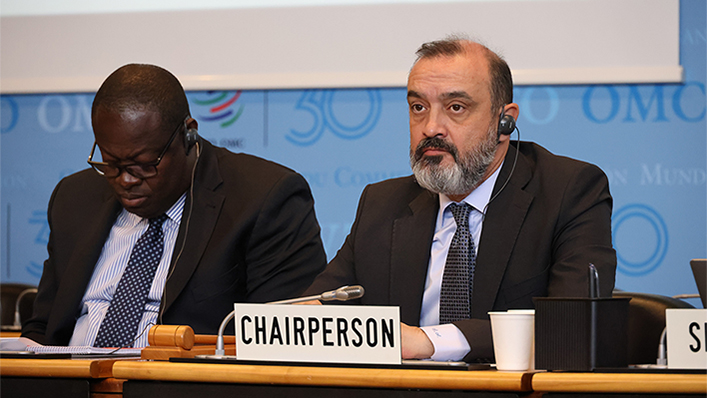
Although WTO members shared a sense of disappointment at the inconclusive outcome of the agriculture negotiations at MC13, the absence of results did not mean that progress had not occurred, he said.
“Throwing away past efforts and restarting from scratch would not be productive,” he told delegates.
At the meeting, Brazil presented its views on how to revive the agriculture talks, following the tabling of its draft decision for adoption by the General Council in July. Brazil’s proposal envisages talks proceeding across all agriculture negotiation topics in parallel, and is based on the Abu Dhabi Draft Text on Agriculture — which in turn is a revised version of the Chair’s text circulated before MC13. In Abu Dhabi, WTO members were unable to agree on whether to conclude a standalone agreement that would establish a permanent solution to the challenges some developing economies face when buying food at government-set prices for public stocks, or whether this topic should instead be addressed alongside other unresolved negotiating topics in the run-up to MC14.
In the ensuing discussions, several negotiators welcomed Brazil’s initiative in tabling a concrete proposal for discussion — with several of them urging their counterparts to build on the progress that has been made to date.
Some of them supported Brazil’s proposal for a General Council decision in July, while others argued that negotiators ought to begin talks immediately on the substance of the unresolved negotiating issues.
Some shared Brazil’s view that a comprehensive approach was needed in order to address all members’ concerns. However, others took the view that the negotiations should be unlocked by focusing on issues that WTO members see as top priorities, such as the purchase of food at minimum prices for public stocks.
The Cotton-4 (C-4) countries — Benin, Burkina Faso, Chad and Mali — also stressed the urgency of addressing distortions affecting global markets for cotton.
Many members favoured resuming text-based negotiations as the way forward, although others expressed caution, noting that more consultations might be needed to explore new ideas and new approaches.
Finally, while some members supported parallel work in both the General Council and the Committee on Agriculture in Special Session, others said the latter should remain the main negotiation forum.
The Chair thanked participants for their comments and said he would reflect on the best way forward.
More
The WTO’s agriculture negotiations encompass various topics, including domestic support, market access, export competition, export restrictions, cotton, public stockholding for food security purposes, the special safeguard mechanism and the cross-cutting issue of transparency.
More on the WTO agriculture negotiations: WTO | Agriculture — negotiations
A glossary of WTO agriculture negotiations terms can be found at this link: WTO | Glossary by Subject
Subscribe to “News Harvest”, the WTO’s monthly food and farm policy trade news round-up.
Share
Reach us to explore global export and import deals